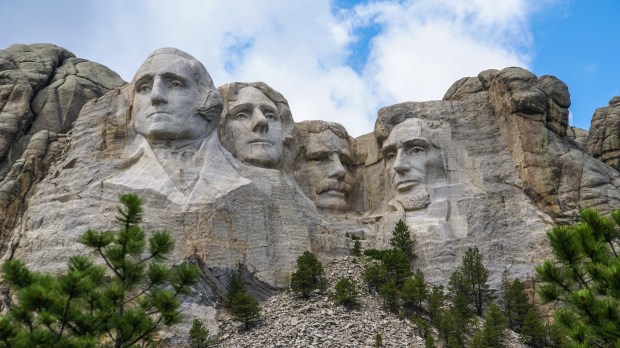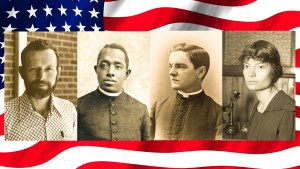Presidents’ Day is not a Catholic holiday — but I once gave 10 reasons Catholics to celebrate it.
But those reasons didn’t catch the true emphasis of the day: individual presidents. After all, Presidents’ Day began as a way to combine the celebration of George Washington’s birthday, Feb. 22, and Abraham Lincolns’ birthday, Feb. 12.
What can a Catholic find to celebrate in those two guys — and the others on Mount Rushmore? Quite a bit, actually.
George Washington was formed by, and friendly to, Catholics.
Well, okay, he wasn’t exactly formed by Catholics — but he did make a strong commitment in his youth to follow the Rules of Civility, character principles developed by French Jesuits. They shaped him into the man he became.
Later, at a time when anti-Catholicism was strong in non-Catholic cultures, the new President George Washington signaled that the new nation would welcome them.
“All those who conduct themselves as worthy members of the Community are equally entitled to the protection of civil Government,” he wrote in a 1790 letter to Catholics. He said he hoped Americans would “not forget the patriotic part which [Catholics] took in the accomplishment of their Revolution” and “the important assistance which America received from a nation in which the Roman Catholic faith is professed,” namely France.
Thomas Jefferson’s words won papal praise.
Speaking of France, another President on Mount Rushmore, Thomas Jefferson, spent years as an ambassador during the War of Independence, and helped broker the deal that brought the French to America’s aid in their Declaration of Independence from England’s King.
That Declaration has, in turn, been admired by popes from Leo XIII to Francis. Pope Francis praised the “ringing words” Jefferson wrote that “have inspired peoples throughout the world to fight for freedom” and added that they “must constantly be reaffirmed, re-appropriated and defended.”
One Catholic’s signature is on Jefferson’s words: Charles Carroll. He became a Member of Congress representing Maryland on July 4, 1776, and signed the Declaration that day. Legend has it that an anti-Catholic fellow member of congress sneered that there were many Charles Carrolls in America, so by signing his name, Caroll was risking nothing. In defiance, Carroll returned to the document and added “of Carollton,” his Maryland hometown, to leave no doubt.
Abraham Lincoln also welcomed Catholics.
Lincoln lived at a time when Catholics were treated with a new wave of suspicion as the first influx of immigrants from Catholic countries made many people nervous. The “Know Nothing” party — whose official name was “the American Party” — gained in popularity in the mid-1800s by opposing immigration, which was a soft way of opposing Catholicism.
Abraham Lincoln repudiated the party in an 1855 letter. “I am not a Know-Nothing,” he proclaimed, and complained, “Our progress in degeneracy appears to me to be pretty rapid. As a nation, we began by declaring that ‘all men are created equal.’ We now practically read it ‘all men are created equal, except negroes.’ When the Know-Nothings get control, it will read ‘all men are created equal, except negroes, and foreigners, and Catholics.’”
Lincoln also famously allowed for a black Catholics in Washington, D.C., to use the White House lawn for a fundraising event to help fund a new parish. The event attracted 1,500 Catholics and raised the at the time impressive sum of $1,200 to build De Porres Chapel and school, which opened in 1866.
Lincoln was no saint, but Bishop W. Francis Malooly in 2009 pointed out the many ways he was a model for Catholics in a pastoral letter worth reading on Presidents’ Day.
Roosevelt reaffirmed religious freedom.
And that brings us to the most recent president on Mount Rushmore: Theodore Roosevelt. He came to the defense of Catholics in a roundabout way, by supporting William Howard Taft. Roosevelt’s successor was accused of being friendly with Roman Catholics, and perhaps even practicing the faith secretly.
Roosevelt defended the nominee saying his beliefs were “his own private concern … between him and his Maker.” Questioning a candidate based on religion, he said, violates “the first principles of our government, which guarantee complete religious liberty and the right to each man to act in religious affairs as his own conscience dictates.”
It is that attitude toward religious freedom that many Catholics want to recapture today in the Church’s fight with the state — and one that the U.S. bishops will be praying on Presidents Day.


